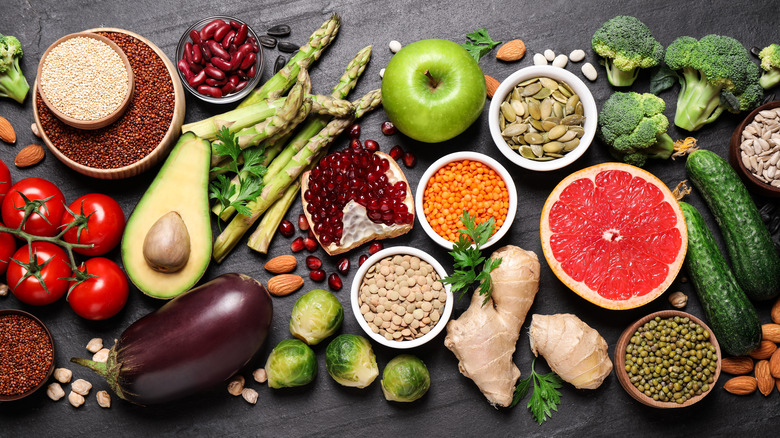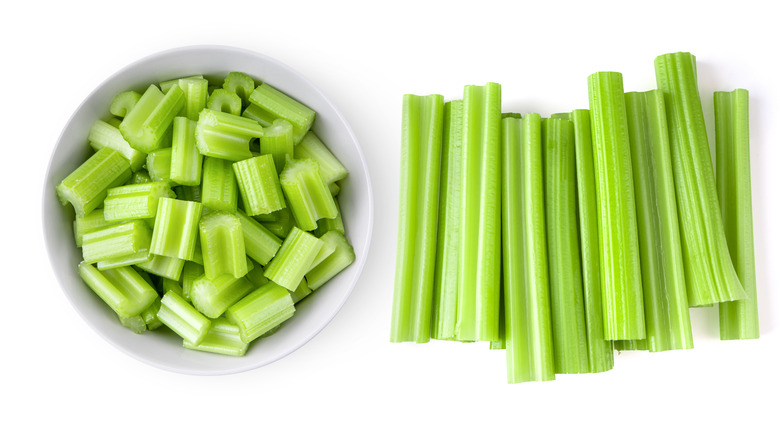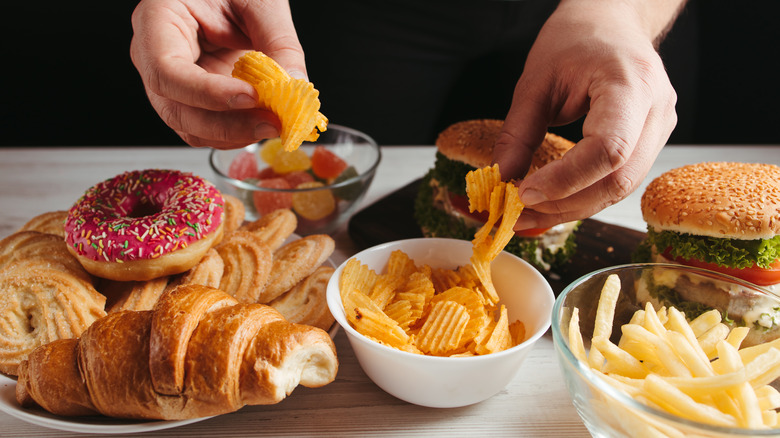Myths About Calories You Should Stop Believing
Calories are often vilified among the health conscious, but in reality, they are just a simple unit of energy. According to an article from The Journal of Nutrition, calories were originally defined in terms of the heat required to raise the temperature of water. More specifically, one Calorie (with an uppercase C) is the "heat needed to raise the temperature of 1 kilogram of water from 0 to 1 degrees" Celsius. As the authors explain, a Calorie with an uppercase C is the same as a kilocalorie, and this is the unit of energy used on U.S. nutrition labels.
Meanwhile, the National Health Service of the U.K. says this unit is often abbreviated as "kcal" on nutrition labels in the U.K. By contrast, Healthline explains that "small calories" (with a lowercase C) refer to the amount of heat needed to raise 1 gram of water by 1 degree Celsius. In general, when you see the word "calories" in reference to food, you can assume this means kilocalories or "large calories," even if the word isn't capitalized.
Calories are found in the macronutrients of food: carbohydrates (carbs), proteins, and fats. The National Agricultural Library of the United States Department of Agriculture states that carbs and proteins each have 4 calories per gram, while fats have 9 calories per gram. However, as an article from Scientific American explains, these numbers are estimates at best. Read on to see some common myths about calories debunked.
Myth: Calorie labels are 100% accurate
If you think nutrition labels can tell you exactly how many calories are in a given food, think again. The U.S. Food and Drug Administration allows for a 20% "margin of allowance" for calories and macronutrients on nutrition labels. This means, for instance, that a food product that claims it has 100 calories may have as many as 120 calories and still be in compliance with the FDA rule. And packaged foods often do have more calories than their nutrition labels claim. A study from the journal Obesity that tested a sample of packaged snack foods found that the actual number of calories in these foods was about 4.3% higher than what was stated on the packages — well within the margin of error that the FDA allows.
In fairness, this isn't necessarily a result of food companies trying to deceive consumers. Estimating the number of calories in any given food is not a trivial task. An article from Scientific American explains modern calorie counts are based on a system developed in the 19th century by American chemist Wilburn Olin Atwater that's never really been updated and can only give us estimates of the number of calories in our food. For instance, these estimates don't take into account whether or not a food is cooked or raw, but this makes a big difference in terms of the number of calories we're able to absorb from the food.
Myth: Counting calories helps with weight loss
While you now know that calorie counts on food labels are estimates and don't necessarily reflect the exact number of calories in a given food, this is not the only reason calorie counting isn't the most effective way to lose weight. As an article from Harvard Health explains, even the most careful calorie calculations don't necessarily give you predictable results. In other words, even if you were able to control the exact number of calories you were consuming, this still wouldn't guarantee weight loss. Factors such as how the food is prepared, the composition of your gut microbiome (the collection of bacteria that live in your gastrointestinal tract), your metabolism, and your activity level all affect how many calories you actually absorb from the food you eat.
Dr. Fatima Cody Stanford, obesity specialist and assistant professor of medicine and pediatrics at Harvard Medical School, says in the article from Harvard Health, "This idea of 'a calorie in and a calorie out' when it comes to weight loss is not only antiquated, it's just wrong." She further advises those who are looking to lose weight to, "Drop the calories notion." Instead, she suggests focusing on diet quality and making sustainable changes to both your diet and activity levels rather than stressing about calories.
Myth: All calories are equal
People who count calories tend to make the mistake of assuming all calories are equal, but they're not. This is to say that two different foods with the same number of calories won't necessarily be digested in the same way, according to an article from Scientific American.
A study from the American Journal of Clinical Nutrition helps illustrate this fact. In this study, participants were split into two groups. Both groups consumed the exact same controlled diet for 18 days, with one exception: One group consumed almonds, and the other didn't. Researchers then examined urine and fecal samples from all participants in order to determine how many calories were absorbed from the almonds, and what they found is that people who consumed almonds only absorbed an average of about 129 calories out of the 170 calories almonds are supposed to contain.
Biologically, this makes sense: The article from Scientific American explains certain macronutrients are more difficult to digest than others. For instance, it takes more energy (as much as five times more) to digest protein versus fat. This is due to the digestive system working harder to break down protein's amino acids. Similarly, this article claims fiber doesn't yield as many calories as other types of carbohydrates, because fiber is also difficult for your digestive system to break down. So, as almonds are high in both protein and fiber, we may not absorb all of their calories.
Myth: Your body absorbs every calorie that's in the food you eat
As you've seen, it's difficult to estimate the number of calories in a given food — but it's even harder to estimate the number of calories you're going to absorb from it, as explained by an article from Scientific American. Even if you knew the exact number of calories you were eating, the question of how many of those calories turn into usable energy for your body is another matter entirely.
The article from Scientific American explains why this is: While your body has an interest in absorbing as many calories as possible from food, the food may actually have its own agenda. For instance, the author observes that seeds ingested by birds often survive the birds' digestive system intact, which is in the best interest of the seeds. This means birds aren't absorbing all (or possibly any) of the calories the seeds contain. Likewise, humans don't always absorb all the calories food contains. Any action you take to process your food — chopping or cooking it, for instance — helps you absorb more calories.
What's more, other factors like an individual's metabolism or food sensitivities can also affect calorie yields from food. As the Scientific American article bluntly points out, "One man's high-calorie latte is another man's low-calorie case of the runs."
Myth: High calorie foods are less healthy than low calorie foods
While companies often like to use the phrase "low-calorie" to make their food products sound healthy, the number of calories a given food contains is not a good measure of how healthy that food is, explains Harvard Health. In other words, a low-calorie food is not necessarily healthy, and a high-calorie food is not necessarily unhealthy. The Harvard Health article gives the example of comparing a sugary beverage to a handful of nuts: While the nuts likely contain more calories than the sugary beverage, no one would question whether or not they're the healthier option of the two.
The article gives a bit of background on where the conflation of "low-calorie" with "healthy" came from: A study from the 1960s found fat and cholesterol were the culprits of heart disease and obesity, thus triggering a decades-long obsession with low-fat foods in the United States. Fat has more calories per gram than carbs or protein, so low-fat is often synonymous with low-calorie. The problem is that this research was biased. As a 2016 study from the Journal of the American Medical Association found, the doctors involved in the 1960s research were paid by the Sugar Research Foundation, whose goal was to obfuscate the unhealthy nature of sugar. The Harvard Health article goes on to implore dieters not to avoid fat, but to focus on healthy fats like nuts and avocados.
Myth: Some foods have negative calories
A study from Bio Archive explains another common myth about calories is that some foods have less energy than the amount of energy it takes to digest them, thus yielding "negative" calories. If this were true, then eating a stalk of celery (often considered a "negative calorie food") might have the same effect as, say, burning calories on a treadmill.
But the study from Bio Archive has shown this idea to be flawed. In this study, lizards were fed celery, and afterward, the researchers collected and examined urine and fecal samples from the lizards to determine how much energy they got from the celery. What they found is that, although the lizards didn't absorb all of the energy the celery theoretically contained, the net gain was still greater than zero, and higher than expected. It's true that digesting foods like celery that are very high in fiber does burn some calories, but you won't burn more calories than what you get from the food.
Of course, this isn't to say celery isn't healthy. It's a popular choice among the health conscious for good reason: It's very high in fiber and beneficial nutrients. Just don't rely on celery (or any food) to burn calories in the same way exercise does.
Myth: You only burn calories when exercising
You already know you burn calories during any sort of physical activity, but you burn calories at rest, too. As the Mayo Clinic explains, the rate at which you burn calories while at rest is known as your basal metabolic rate or basal metabolism. Your basal metabolism depends on a variety of factors, including your body size and composition.
What's more, your basal metabolism is not set in stone. It changes over the course of your life, and it can also change as a result of your habits. For instance, the Mayo Clinic reports that people with more muscle mass have a greater basal metabolic rate. An article from Healthline explains why this is true: Muscle is more "metabolically active than fat," which is to say, it costs your body more energy to maintain its muscle than its fat. As such, Healthline recommends weightlifting and other activities that build muscle if your goal is to increase your basal metabolic rate.
But weightlifting isn't the only way to increase your basal metabolism. A randomized controlled trial from Applied Physiology, Nutrition, and Metabolism found four weeks of sprint interval training could increase basal metabolic rate, suggesting high-intensity activities other than weightlifting can accomplish similar results — though more studies need to be implemented.
Myth: Your fitness tracker tells you exactly how many calories you burn
Fitness trackers can have many health benefits, but a study from the Journal of Personalized Medicine warns that you shouldn't rely on these trackers to tell you how many calories you burn during physical activity. The study examined the accuracy of seven different wrist-worn fitness trackers among 60 volunteers, and while six out of the seven devices were able to accurately measure heart rate within an average 5% margin of error, none were found to provide accurate measurements of the number of calories burned (referred to as energy expenditure).
An article from Stanford Medicine (where the study was conducted) clarifies that the average margin of error for energy expenditure was 27% in the most accurate device, and 93% in the least accurate device. As senior author Euan Ashley said that "the energy expenditure measures were way off the mark. The magnitude of just how bad they were surprised me."
Anna Shcherbina, another researcher involved in the study, explains in the article from Stanford Medicine that heart rate is measured directly, but energy expenditure has to be measured by proxy. Most devices calculate this estimate based on self-reported metrics from users, such as age, sex, or weight. But many other factors determine energy expenditure, and not all can be self-reported. She further hypothesizes that the algorithms used by companies to calculate an individual's estimated energy expenditure are "making assumptions that don't fit individuals very well."
Myth: The 2,000-calorie diet is a good estimate of everyone's needs
If you look at the nutrition label on just about any packaged food in the United States, you'll most likely see a small block of text at the bottom indicating that the given percentages of various nutrients are "based on a 2,000-calorie diet." But an article from U.S. Health News explains the 2,000-calorie diet has no scientific backing. The article goes on to explain where this estimate came from: Surveys conducted by the U.S. Department of Agriculture in the early 1990s that were used to estimate the average range of daily calories eaten by men and women.
According to this data, men consumed between 2,000 and 3,000 daily calories, while women consumed between 1,600 and 2,200 daily calories. From this data, 2,000 calories was determined to be a very rough average of the number of calories Americans were consuming every day, and this became the average used on nutrition labels for the purposes of calculating percentages of daily nutrients. Importantly, this was all based on self-reported survey data (which is notoriously unreliable), and it has never been updated since the 1990s.
The fact is that the 2,000-calorie diet is not a reasonable estimate of most individuals' needs. The article suggests keeping a food diary for at least 14 days to estimate your actual caloric needs (per U.S. News Health).
Myth: Burning 3,500 calories equals one pound of weight loss
You may have heard that you need to burn 3,500 calories to lose one pound of weight. A review article from the International Journal of Obesity claims that this weight loss rule has been cited in upward of 35,000 educational websites, numerous textbooks, and even the U.S. Surgeon General guidelines. This article reviewed seven studies on weight loss and found that individuals lost substantially less weight in these studies than what would have been predicted by the 3,500 calorie rule.
Part of the problem with the rule is that it doesn't take into account differences between individuals. The amount of weight lost from burning some number of calories will vary based on individual factors such as age, height, weight, and sex. The rule is meant to provide a quick and simple "estimate" of potential weight loss from working out, but a better estimate can be achieved by using dynamic models and calculators that take such factors into account.
The article from the International Journal of Obesity provides two such online calculators: A weight loss predictor calculator from the Pennington Biomedical Research Center at Louisiana State University, as well as a body weight planner from the National Institute of Diabetes and Digestive and Kidney Diseases. While these calculators will provide a better estimate than the 3,500 calorie rule, the researchers caution that they still don't take all relevant factors into account.
Myth: Eating 1,200 calories a day (or less) is an effective way to lose weight
As Harvard Health explains, the number of calories in a given food is not a reliable measure of how healthy that food is, or how likely it is to assist with weight loss. It follows that adhering to a low-calorie diet is not necessarily going to help you eat healthfully or lose weight. That said, if you follow an extremely low-calorie diet (1,200 calories a day or less), you will indeed lose weight — but this weight loss isn't going to be sustainable, as reported by an article from Perspectives on Psychological Science. The article explains that severely restricting the number of calories you consume can ultimately reduce your metabolic rate, making it more likely you'll gain the weight back.
This has also been shown by a study from the journal Obesity, which followed up with 14 participants from the popular TV show "The Biggest Loser" six years after their participation on the show ended. These adults had followed a severely restricted diet and lost an enormous amount of weight by the end of their time on the show, yet six years afterward, all but one had gained most of that weight back. Even more concerning, their resting metabolic rates had slowed down more than expected. Enduring changes to metabolism are part of the reason why people tend to gain weight back after severely restricting their caloric intake, despite their best efforts.
Myth: You should always avoid empty calories to be healthy
Among those who care about nutrition, it's common to believe "empty calorie" foods or "junk" foods (such as soda, candy, chips, and fast food) should be avoided at all costs. However, scientific research suggests this goal isn't just unfeasible — it may actually cause other health problems. A study from the journal Appetite surveyed 188 women about their diets as well as their attitudes about food and nutrition, and the study found those who attempted to follow the most rigid diets had symptoms of eating disorders and "mood disturbances." What's more, the average body mass index (BMI) was actually higher among those who attempted to follow a rigid diet than among those whose diets were more flexible. Another study also from the journal Appetite found a strong correlation between rigid dieting and overeating. Those who followed a flexible diet plan were significantly less likely to overeat.
A controlled study from Psychosomatic Medicine offers a potential explanation: This study found severe caloric restriction (i.e., following a 1,200 calorie diet) significantly increased cortisol, the stress hormone. Cortisol is well-established to increase appetite, particularly for "highly palatable foods" or junk foods, according to a longitudinal study from the journal Obesity. More specifically, higher cortisol levels are correlated with weight gain. So, instead of stressing about avoiding junk food, it may be healthier in the long run to eat it once in a while.
Myth: Zero calorie artificial sweeteners are healthier than sugar
As you are no doubt already aware, high sugar consumption is associated with obesity, according to a review from Critical Reviews in Clinical Laboratory Sciences. But scientific research hasn't found artificial sweeteners to be a healthy alternative to sugar. A systematic review and meta-analysis from the Canadian Medical Association Journal that reviewed randomized controlled trials found artificial sweeteners did not have a significant effect on body mass index (BMI) as compared to sugar-sweetened beverages. The review also included longitudinal studies that followed participants for a longer period of time than the randomized controlled trials, and these studies actually showed a correlation (in an animal review) between artificial sweetener consumption and weight gain. So, artificial sweeteners may not be any healthier than sugar when it comes to preventing weight gain.
What's more, the use of certain artificial sweeteners has been linked to other health problems. Though past research on the link between the artificial sweetener aspartame and cancer has been mixed, a 2021 rodent study from Environmental Health found aspartame to be carcinogenic in rodents. Artificial sweeteners may also trigger headaches in some people: A study from the journal Headache found aspartame could cause headaches, and another study also from the journal Headache found sucralose (also known as Splenda) could cause migraines in certain individuals.
Myth: You can save your calories for the weekend
Among those trying to lose weight, there is a myth that calories can be "saved" for the weekend, or holidays, or any other time a person wishes to overindulge. But dietitian and exercise physiologist Kim Gorman says in an interview with NBC News that many dieters who manage to be in a caloric deficit during the week often more than make up for it over the weekend, meaning they consume significantly more calories over the weekend than the number of calories they avoided during the week. She suggests some indulgence over the weekend is okay, as long as you make sure to exercise.
In fact, having a more flexible diet over the weekend may actually be healthier in the long run than trying to follow a strict diet every day of the week, according to a study from the Nutrition Journal. In this study, dieters who followed a less strict diet on the weekends were more likely not to regain the weight they lost than dieters who followed a stricter plan. The key difference here may be one of attitude: Choosing to be flexible has different effects than oscillating between extremes. While it isn't feasible to severely restrict calories throughout the week and then overindulge on the weekend, having an attitude of flexibility seems to be a more reliable predictor of success than trying to follow a very strict diet all the time.















